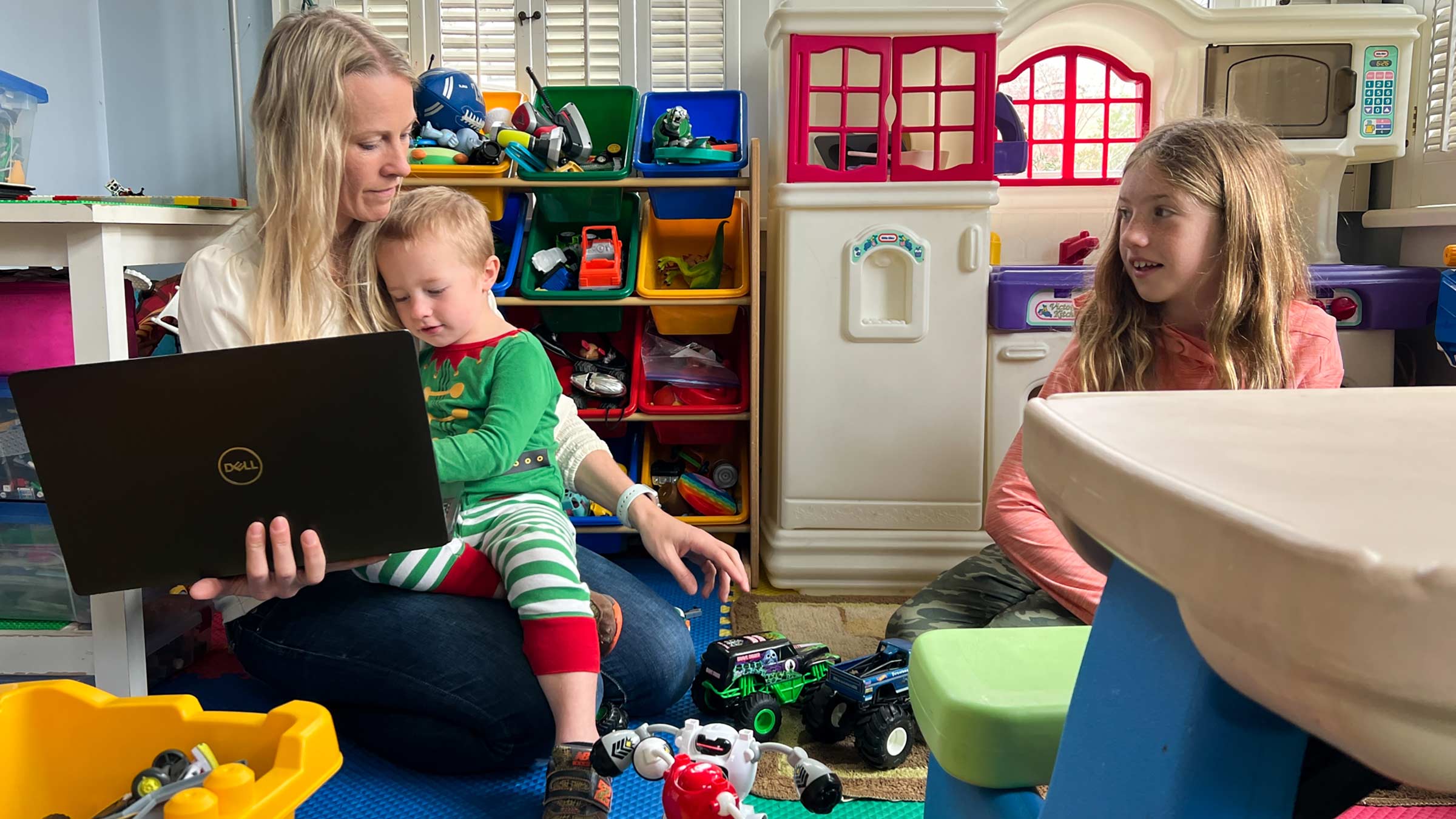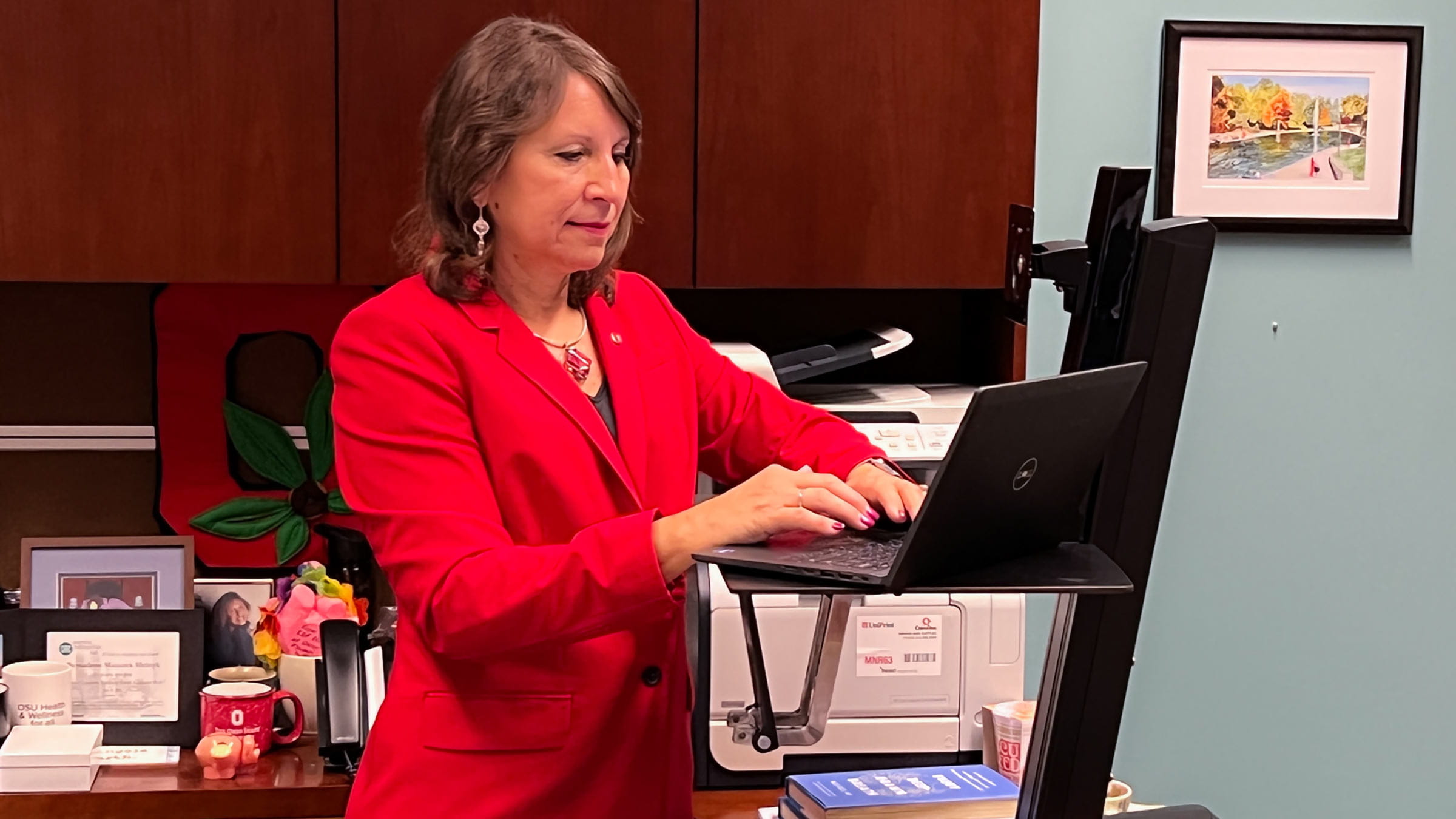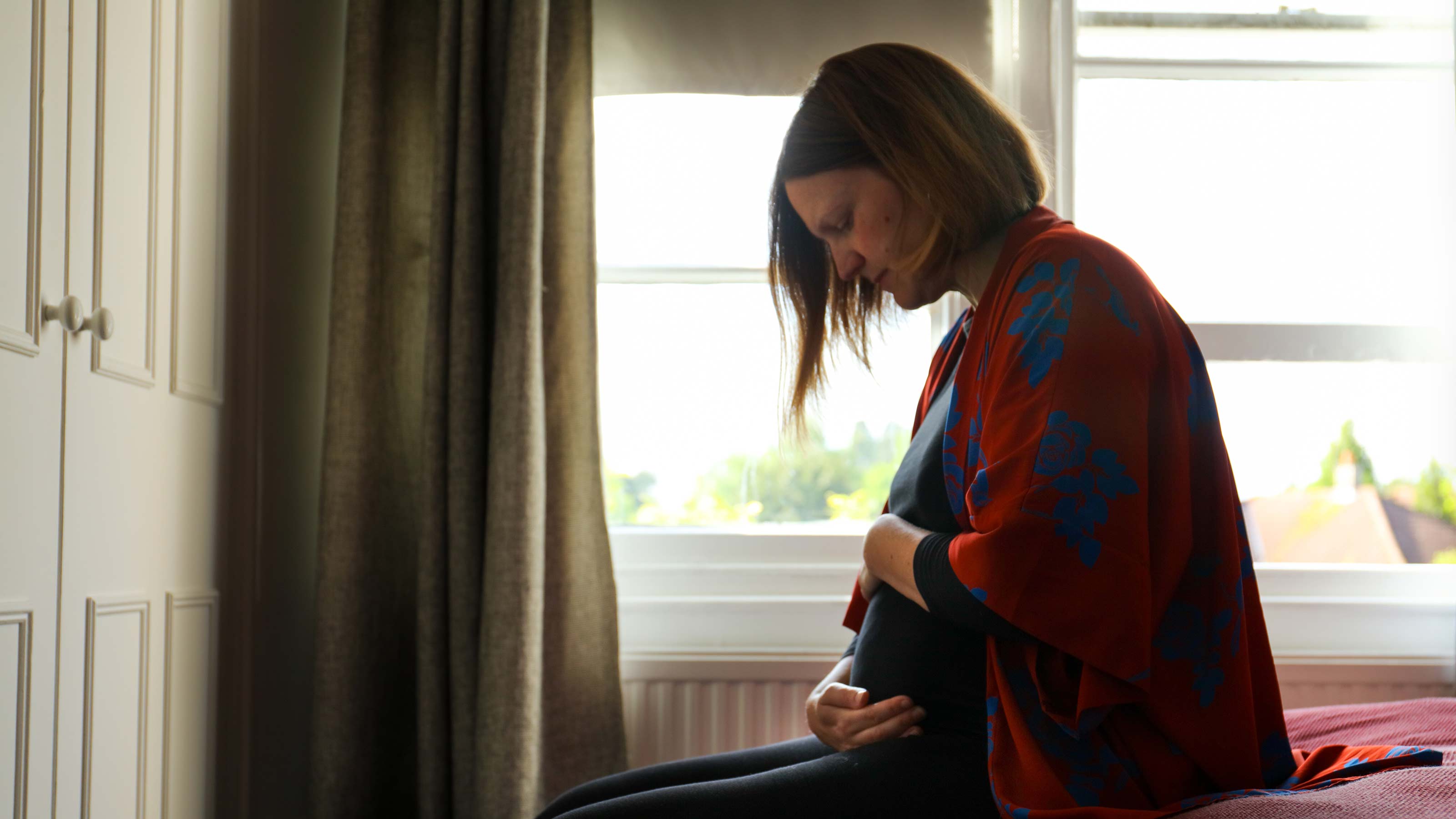Burned out by pandemic parenting? You’re not alone
New report shows danger of working parental burnout, offers strategies for families
A few months into the COVID-19 pandemic, Kate and Jason Gawlik were trying to get dinner on the table as their children ran around the house playing tag.
They were beat after days upon days of managing full-time work and full-time care and schooling of their young children.
“Can you believe we do this every day?” Jason asked.
Through her exhaustion, Kate answered with an anticipated “no.” And as her mind replayed the adrenaline-driven hours of the past several weeks, it struck her: They were burned out.
“I never really thought about what I was doing all day. And so, it hit me like bricks: This is hard. This is really, really hard. And it was validation of how hard it was,” says Kate Gawlik, DNP, APRN-CNP, FAANP, who directs undergraduate health and wellness academic programming at The Ohio State University College of Nursing. “We’re at a very hard time anyway. And then just throw this pandemic on us. I mean, even the playgrounds were closed.”
It’s experiences like these across the country that inspired the report “Pandemic Parenting: Examining the Epidemic of Working Parental Burnout and Strategies to Help,” written for parents by Gawlik and Bernadette Melnyk, PhD, APRN-CNP, FAAN, who serves as Ohio State’s vice president for health promotion and university chief wellness officer.
They want parents to know: You’re not alone. There are things you can do to ease burnout. If you’re feeling overwhelmed, help is available.
Watch more about our Pandemic Parenting report on the “TODAY” show
Who’s burned out?
Millions and millions of American parents experienced burnout when they were blindsided by seemingly insurmountable levels of stress as COVID-19 forced workplaces, child care and schools to move into homes. Parents were running at a chaotic 24/7 pace and felt isolated with nowhere to turn.
So Drs. Melnyk and Gawlik weren’t surprised when a survey they conducted for “Pandemic Parenting” revealed burnout in 66% of working parents with live-in children younger than 18.
To assess whether working parents are burned out, Drs. Gawlik and Melnyk created a 10-item scale that can be completed to score burnout levels and determine ways to respond. The valid and reliable scale is the first of its kind specifically for working parents, and it’s included in the “Pandemic Parenting” report as a tool parents can use themselves.
Danger of burnout
While the survey was conducted from Jan. 19 to April 28, 2021 — when pandemic concerns were high, vaccines for children unavailable and certain restrictions still in place — burnout and its ramifications didn’t just go away.
The Gawliks’ four children were ages 8, 6 and 3 years and 10 months when the pandemic first brought its chaos to Ohio. Mom found herself taking online meetings into closets to avoid noisy or active children in the background. She’d stay up until 1 a.m. to finish the work that had been interrupted by a hungry baby or a second grader learning math.

It was a vicious cycle with no break, says Gawlik, and with no end in sight. She got little sleep, making her feel more irritable, with stress that had the potential to spill over to her children.
Read frequently asked questions about parental burnout
The pandemic took away parents’ control of so many things that kept families on an even keel. They were sent reeling on a never-ending roller coaster wondering what the day, or the hour, might bring. Burnout, Gawlik says, persists as parents continue to work at home, schools quarantine students and children with sniffles stay home. Or it might ebb and flow as parents constantly discover new things to face each day.
“We’re going to see these issues for a long time,” says Dr. Melnyk, who also is dean and Helene Fuld Health Trust Professor of Evidence-Based Practice at the College of Nursing. “And not only is this affecting parents’ mental and physical health, but it has huge adverse implications for children. We’ve known for decades about what’s called the emotional contagion hypothesis: When parents are stressed, anxious or depressed, it rubs off on the children.”
The “Pandemic Parenting” survey revealed that burnout can lead to depression, anxiety or increased alcohol use among parents. It can also make it more likely that a parent will insult, criticize, scream or curse at or spank a child. And, it can lead to both internalizing problems, such as anxiety and depression, and externalizing problems, such as acting out behaviors, in children.
If you’re in need of emotional support, thinking about suicide or concerned about a family member or friend, the National Suicide Prevention Lifeline is available 24/7 at 800-273-8255.
Turning rain into rainbows
Drs. Melnyk and Gawlik emphasize that parental burnout is normal. If you’re overwhelmed, feeling unmanageable stress or struggling to balance work and raising children, it doesn’t mean you’re extreme. The feelings are common.
And there is hope.
“I always say ‘rainbows follow rain,’” Dr. Melnyk says. “But parents have got to prioritize their own self-care. Even if it’s two, five-to-10-minute breaks a day, focus on something that benefits your mental or physical health: Close the door. Go in and have a hot cup of tea. Put on some music you enjoy. Do jumping jacks, get moving.”
But parents often feel guilty. They don’t have time. They’re overwhelmed. Still, Dr. Melnyk adds, think about the emergency instructions you hear when you’re on an airplane: If the oxygen masks drop, parents are told to put them on themselves first, before they put them on their children.
“Parents cannot keep pouring from an empty cup. It’s not selfish to take self-care. It’s absolutely necessary if we’re going to take good care of our children and families or be good at our jobs.” Dr. Melnyk, Ohio State’s vice president for health promotion and university chief wellness officer

Strategies and resources for change
Drs. Gawlik and Melnyk have included specific strategies for addressing burnout in their report. It’s all about decreasing stressors and increasing resources. For example, limiting the number of after-school activities is one way to decrease stressors; finding people to carpool with for those activities increases resources.
Along with taking good self-care, the authors recommend being kind to yourself, talking to someone you trust, building mental resiliency and coping skills and asking for help when needed.
“It is a strength to recognize when we need help, not a weakness,” says Dr. Melnyk, a professor of Pediatrics and Psychiatry in the Ohio State College of Medicine. “If you’re at a point where depression, stress, anxiety is interfering with your concentration, your judgment or your functioning, that’s a big red flag. You’ve gotta get some help. Talk to your primary care provider or seek mental health counseling support.”
Other resources in the report come from the third edition of “A Practical Guide to Child and Adolescent Mental Health Screening, Evidence-Based Assessment, Intervention, and Health Promotion,” which is co-edited by Dr. Melnyk. The resources help parents understand depression and certain other mental health conditions in children, along with ways to address them.
Further, the report includes a link to participate in a study that is evaluating online stress-reduction modules for 9- to 14-year-old children and their parents. The hope is that children and their parents will practice these modules to determine their effectiveness.
The modules are based on cognitive behavioral therapy (CBT), the gold standard for evidenced-based treatment of depression and anxiety, says Dr. Melnyk, who served on the National Academy of Sciences expert panel that created the modules and also is the executive director of the Helene Fuld Health Trust National Institute for Evidence-based Practice in Nursing and Healthcare. CBT teaches people to catch unhealthy negative thoughts, check them and use strategies to change them to positive ones.
Gawlik says she found some relief after accepting that she isn’t superhuman and taking the findings in the new report to heart.
“I used to say ‘yes’ to everything,” Gawlik says. “It really made me stop and learn to say ‘no’ and just say, ‘I don't have the bandwidth for that right now,’ and then to really work on not feeling guilty about that.”

Learn more about working parental burnout, rate your level of burnout and find strategies to help your family thrive
Download the “Pandemic Parenting” report from the Office of the Chief Wellness Officer and the College of Nursing.
Download the report




